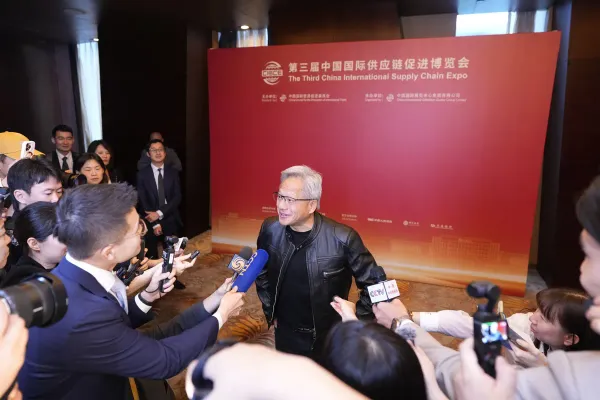Rock Star CEO Jensen Huang Shows Off Diplomatic Skills in China


By Bloomberg NewsJuly 18, 2025 at 5:47 AM UTC
Hi, this is Allen Wan in Beijing, where I spent most of the week chasing Nvidia CEO Jensen Huang.
One thing I’ve learned is he’s more than just a chip executive. He’s a rock star cum pretty skillful diplomat. Read more about Huang, the reluctant emissary, here.
Officially, Huang came to Beijing to give a keynote speech at a supply chain expo. Yet the CEO of the world’s most valuable company took advantage of the sudden and surprise end to some chip export curbs to tell Chinese customers that Nvidia was back in business for them.
His trip coincided with assurances from the Trump administration that it would allow the chipmaker to export some of its artificial intelligence processors to China. Read about that big change here and how the shift has sparked talk of a China-US grand bargain here.
Huang said the export licenses could come soon, allowing Nvidia to recoup some of the billions it wrote off after Trump’s ban. The removal of the curbs could also benefit Chinese tech companies that still prefer what Jensen concedes isn’t Nvidia’s most-advanced chip over alternatives offered by local players such as Huawei.
The H20 is still a “great” chip for reasoning and large language models, he said, adding that Nvidia would also roll out a new semiconductor that could further spur China’s development of humanoid robots.
How Huang has been able to persuade the Trump administration to reverse course while also reaffirming to Chinese leaders that he is a reliable friend — Huang met trade negotiator He Lifeng this week — is worthy of a masterclass in corporate diplomacy. At a time when both Tesla’s Elon Musk and Apple chief Tim Cook have fallen out of favor with Trump to differing degrees, Huang has gotten on well with the unpredictable leader.
I had a chance to witness his people skills first-hand during a briefing at the Mandarin Oriental hotel. Wearing his trademark black leather jacket outside in the summer heat, Huang was a good sport as several reporters, instead of asking questions, requested selfies and autographs.
He gave some autographs, including on the back of one person’s shirt, though he declined to sign somebody’s smartphone.
During his visit, Huang was hounded like a celebrity. He was photographed slurping noodles and gave interviews with state media. He spoke of his admiration for some of the nation’s most innovative companies such as Xiaomi and Deepseek, and the world-class capabilities of China’s AI researchers. Read more about his high praise here.
He said he wished he could cruise around in Xiaomi’s latest electric car in America, where US duties make them cost prohibitive.
Huang drew laughs when he talked about his normally calm demeanor turning to terror when he went up to the rostrum at the expo to give his keynote in Mandarin. He says he’s less than fluent in the language given he moved from Taiwan, where he was born, to Thailand and then to the US as a child.
Other times he waxed on about the wonders of AI and automation, downplaying the potential loss of jobs.
Through it all, the Nvidia chief came across as smart, funny and savvy, showing off the charm that has enabled the company to largely shake off tensions between the US and China over trade and technology, not to mention Trump’s calls for US companies to bring manufacturing back home. Watch a short documentary on the trade war here.
Huang didn’t hesitate about repeating to everyone that his company is now worth some $4 trillion, while name-dropping Trump to demonstrate that he has the ear of the US leader.
“I went to Washington a week ago before I came here and I told President Trump and his cabinet that I was coming to China and long before I traveled, President Trump was delighted to help celebrate a monumental day for Nvidia as you know,” he said. “We achieved a $4 trillion market value. He was proud of it and very excited for me. I told him about my trip here and he said, `Have a great trip.’”
While Huang’s persistent view that chip curbs would hurt American companies more than helping China militarily may have finally paid off, the reversal could have also been good luck and better timing. Senior US officials have recently said that allowing some less-advanced Nvidia chip sales was part of trade negotiations.
Moreover, Trump may be dialing down his confrontational tone in an effort to secure a summit with his counterpart Xi Jinping later this year and a trade deal with the world’s second-largest economy. Read more about that Trump strategy here.
Regardless, Huang is succeeding where other billionaires have failed, and all the more impressively so because it’s in AI, a field where the US and China are in fierce competition for leadership. These are the kinds of wins that will help Nvidia stay the world’s most valuable company.